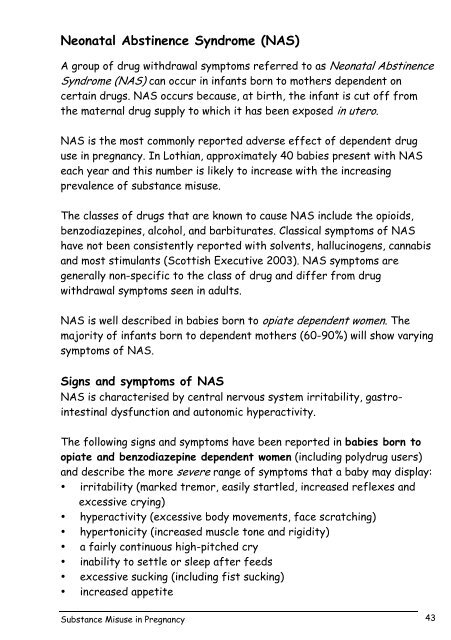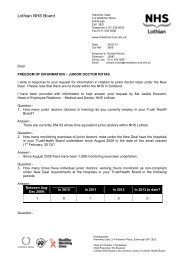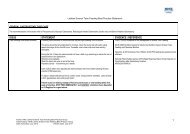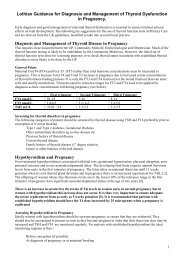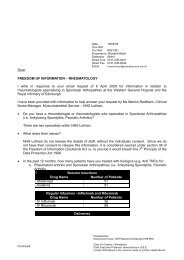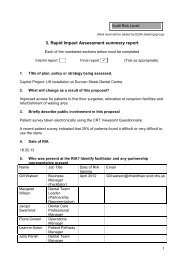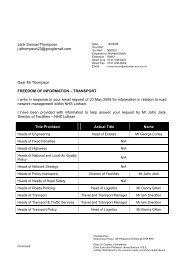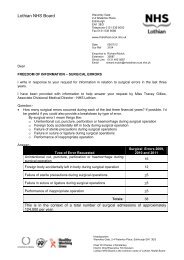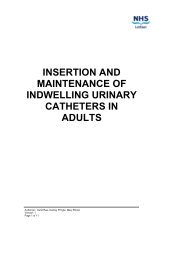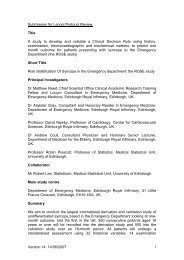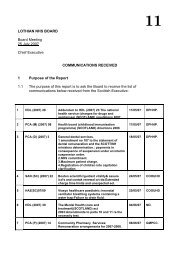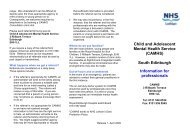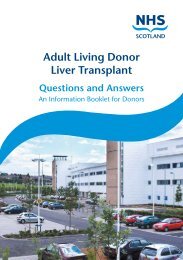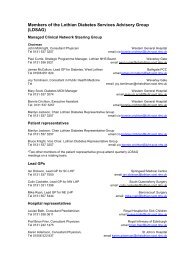Substance Misuse in Pregnancy - NHS Lothian
Substance Misuse in Pregnancy - NHS Lothian
Substance Misuse in Pregnancy - NHS Lothian
Create successful ePaper yourself
Turn your PDF publications into a flip-book with our unique Google optimized e-Paper software.
Neonatal Abst<strong>in</strong>ence Syndrome (NAS)<br />
A group of drug withdrawal symptoms referred to as Neonatal Abst<strong>in</strong>ence<br />
Syndrome (NAS) can occur <strong>in</strong> <strong>in</strong>fants born to mothers dependent on<br />
certa<strong>in</strong> drugs. NAS occurs because, at birth, the <strong>in</strong>fant is cut off from<br />
the maternal drug supply to which it has been exposed <strong>in</strong> utero.<br />
NAS is the most commonly reported adverse effect of dependent drug<br />
use <strong>in</strong> pregnancy. In <strong>Lothian</strong>, approximately 40 babies present with NAS<br />
each year and this number is likely to <strong>in</strong>crease with the <strong>in</strong>creas<strong>in</strong>g<br />
prevalence of substance misuse.<br />
The classes of drugs that are known to cause NAS <strong>in</strong>clude the opioids,<br />
benzodiazep<strong>in</strong>es, alcohol, and barbiturates. Classical symptoms of NAS<br />
have not been consistently reported with solvents, halluc<strong>in</strong>ogens, cannabis<br />
and most stimulants (Scottish Executive 2003). NAS symptoms are<br />
generally non-specific to the class of drug and differ from drug<br />
withdrawal symptoms seen <strong>in</strong> adults.<br />
NAS is well described <strong>in</strong> babies born to opiate dependent women. The<br />
majority of <strong>in</strong>fants born to dependent mothers (60-90%) will show vary<strong>in</strong>g<br />
symptoms of NAS.<br />
Signs and symptoms of NAS<br />
NAS is characterised by central nervous system irritability, gastro<strong>in</strong>test<strong>in</strong>al<br />
dysfunction and autonomic hyperactivity.<br />
The follow<strong>in</strong>g signs and symptoms have been reported <strong>in</strong> babies born to<br />
opiate and benzodiazep<strong>in</strong>e dependent women (<strong>in</strong>clud<strong>in</strong>g polydrug users)<br />
and describe the more severe range of symptoms that a baby may display:<br />
• irritability (marked tremor, easily startled, <strong>in</strong>creased reflexes and<br />
excessive cry<strong>in</strong>g)<br />
• hyperactivity (excessive body movements, face scratch<strong>in</strong>g)<br />
• hypertonicity (<strong>in</strong>creased muscle tone and rigidity)<br />
• a fairly cont<strong>in</strong>uous high-pitched cry<br />
• <strong>in</strong>ability to settle or sleep after feeds<br />
• excessive suck<strong>in</strong>g (<strong>in</strong>clud<strong>in</strong>g fist suck<strong>in</strong>g)<br />
• <strong>in</strong>creased appetite<br />
<strong>Substance</strong> <strong>Misuse</strong> <strong>in</strong> <strong>Pregnancy</strong><br />
43


